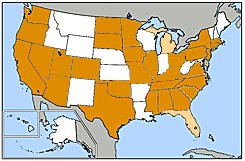Austin, TX

Education Secretary Margaret Spellings: “We shouldn’t try to water down accountability efforts with fancy sounding words like ‘authentic assessment’ or ‘multiple measures.’”
Rough translation: “We’ll continue to use cheap, over-simplified standardized tests that enshrine a narrow set of largely irrelevant trivia and basic skills while de-emphasizing what students will really need in the global 21st century.”
Good idea. Better yet, why not just walk around the conference room here and slap the faces of every teacher and student in the room? I fully realize that she is in a different position than the rest of us, but this statement ruffled the feathers of every teacher that heard it, and it should.
We have a dramatic shift happening in America in the face of globalization and the exponential changes in technology, information, culture and the economy. But it seems that many educators are unaware of this scale of this tsunami of change happening around them, and most policy-makers are unsure of what changes to our education system might actually work at the ground level.
People constantly talk about “achievement” and reference this “achievement” in relation to teacher quality, socio-economic status, absenteeism, race, the relative humidity, and any other variable we can compare it to. But the fundamental question of “what is achievement in the first place?” is rarely addressed. We have taken it for granted that we are accurately measuring how well our students “achieve,” and that we can put this number on a linear scale. But we need to ask ourselves what achievement is. And ask again. And again. And again. Because the answer is continually evolving as the world around us changes.

A hundred years ago, reading, writing and math (all at a very basic level) were good enough for most students in public schools. It was a physical workforce composed mostly of farmers and factory workers. In the second half of the 20th century, knowledge became more important as machines and foreign workers did more and more of the physical work. Education responded by becoming somewhat broader, more analytical, and modern high schools developed. We stayed competitive by producing larger numbers of qualified knowledge workers.
We face a similar threat today, but perhaps more daunting, challenging and immanent. Many white-collar knowledge jobs are being supplanted by highly skilled overseas workers or are being replaced (or at least fundamentally altered) by highly advanced technology. At the same time, new markets are developing in unheard-of fields and locations worldwide.
Where will students go to find the jobs of the 21st century? Will it be a “race to the bottom” if we attempt to compete directly with our overseas competitors who can do the same tasks at a fraction of the cost? And how will we stay on (or near) the top if we continue to define “achievement” as being basic proficiency on century-old knowledge and skills? These are the fundamental questions that we need to ask instead of moving blindly forward while looking to the past for answers. Are reading, writing and arithmetic important? Certainly! They are "gateway" skills that must be learned. But they are not enough anymore.
So what will we do? That’ll have to wait until the next episode because the beverage cart is coming down the airplane aisle, and my urinary tract needs a shot of cranberry juice. Later.























